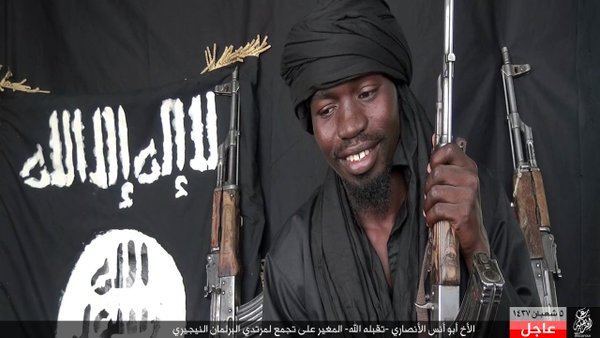
The suicide bomber as shown in Islamic State’s propaganda release
The Islamic State West Africa (ISWA), formerly known as Boko Haram, released a statement claiming responsibility for yesterday’s suicide bombing in Maiduguri, the capital of the northeastern Borno State. There are conflicting reports about the damage from the attack.
In the statement, the jihadist group claimed “no less than 15 were killed” and that 20 other people were injured in the suicide bombing. It went on to say that “after planning in advance, it was possible for the brother Abu Anas al Ansari (pictured above) to detonate his explosive belt in the middle of the apostate Nigerian parliament gathering in Maiduguri.” However, the numbers given by the Islamic State have widely differed with press reports from the region.
While the media corroborated the ISWA’s information that two police officers were killed in the attack, the number of civilians killed has ranged anywhere from two to five people. Reuters, quoting rescue workers from the scene, reported five people were killed in the blast and that 19 others were left wounded. Nigerian news outlet The Vanguard reported only the two policemen at the gates of the Borno State Government Secretariat were killed in the attack.
Discrepancies in numbers have occurred previously as the government attempts to play down the impact of attacks.
Just hours before the attack at the Secretariat, another suicide bomber was confronted in the village of Sulaimanti just outside of Maiduguri. According to Nigerian officials, the bomber was attempting to enter a local mosque to detonate during early morning prayers. Residents attempted to restrain him before he detonated himself, which left five people badly injured.
Maiduguri has been frequently hit by suicide attacks in recent months. In late March, ISWA killed more than 20 after two female suicide bombers detonated their explosives at a mosque in the village of Ummarari outside of Maiduguri. In late December, ISWA first launched a coordinated assault on Maiduguri by setting in motion at least two female suicide bombers. The two detonated as part of a wider assault, killing at least 15 people. As fighting raged on to a second day in the city, another woman detonating herself near a mosque, killing 20.
To the north of Maiduguri, the small village of Dawari was also attacked in the assault. However, Nigerian security officials have said their forces intervened and were able to kill 10 other would-be suicide bombers. (See LWJ report, Islamic State West Africa launches coordinated assaults in northeast Nigeria.)
The two suicide bombings come after the Nigerian military has claimed several successes in recent weeks. On Apr. 26, the military said it killed a top ISWA commander in Borno. While on May 1, the Nigerian military claimed it captured a key bomb making facility of ISWA in the town of Ngala. Additionally, the army has said it recaptured seven villages in northeastern Nigeria last week. But, in retreating in other areas of Borno, ISWA burned down two villages in recent days.
Yesterday’s suicide bombing is intended to show that ISWA retains the operational capacity to strike in the heart of major, well protected cities like Maiduguri despite being pushed back elsewhere in the country. The rate of major attacks have waned in recent months as the Nigerian military continues to make gains in recapturing ISWA-held territory. This includes the use of female suicide bombers, which has slowed drastically compared to last year. However, according to data compiled by The Long War Journal, ISWA has used at least 113 female suicide bombers since June 2014.








1 Comment
these kinds of article gives credence and relevance to these animals. the reporting method seems to embolden the terrorists.”The Islamic State West Africa (ISWA), formerly known as Boko Haram…” do they really need these kind of publicity? Terrorism must be discouraged as much as possible, including the use of media as a tool